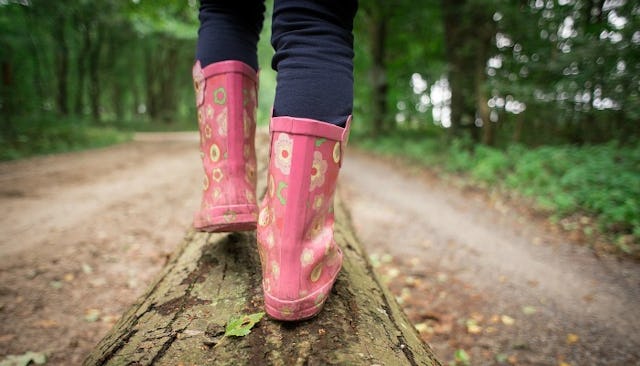Let's Stop Asking, 'How Did The Parents Let This Happen?' In Response To Unexpected Tragedy

On New Year’s Eve, a 6-year-old boy went missing in Colorado. His body was just identified yesterday when he was found in a nearby pond. This is devastating news. “Every parent’s worst nightmare,” the news stories always say when these things happen, because it’s true. There is nothing worse. Apparently he had a fight with siblings and left the house, and had a history of wandering off before. I’m unclear as to the exact circumstances, but of course as soon as he was reported missing, the frenzy began: How did the parents let this happen?
I’ve read that his mom was at work and a grandparent was taking care of him. I’m not sure it it’s true or not. It doesn’t matter. I don’t care. When Jessica Ridgeway was abducted in our community four years ago, she was walking to school alone, and her mother, who worked night shifts, was sleeping. Can you imagine anything worse than not being there to protect your child from harm? No. Of course you can’t.
I couldn’t help myself from reading the comments on the Denver’s 9News Facebook page, claims like “If my child had a history of wandering away from home, I would put a GPS tracker on him.” “Where were the parents?” “I would never…” The list goes on — you can imagine. We’ve all read comments like this, about the gorilla incident last year, the alligator at Disney World, really anytime something tragic occurs that we want to add to our imaginary, completely ineffective list of “Things That Could Never Happen To Us.”
Because that is what we are consciously or subconsciously saying when we judge, blame, and shame parents when terrible things happen: That could never happen to me. But of course we all know that it can, in some form or another. We have all turned our backs, crossed our fingers while we ran inside the house for a moment, picked up our phone at the park out of boredom. We aren’t perfect. And even if we were? We are also at the mercy of the complexity of the human body, of illness and disease. It’s the worst part of being a parent — I think we can all agree on that.
Years ago, I saw a movie or TV show (for the life of me I can’t remember what it was) where two people were sitting on a bench on a boardwalk watching a family rollerblading. The kid was bundled within an inch of his life, covered in pads and helmets, and the person watching commented, “Someday that kid is going to get bitten by a tick and die.” It’s really not funny, perhaps inappropriate even, but I think we can all relate to the sentiment. And that sucks — the thinking that we can do everything we can to keep our kids safe in a certain way, and yet we can never prepare for everything. Perhaps it’s the unexpected we should fear the most.
When an acquaintance had a second-trimester miscarriage, one of my pregnant friends, also out of her first trimester, said, “I thought I was out of the woods at this point.” I wanted to say: We are never out of the woods. We all have so much to lose from the moment we conceive, adopt, or even start planning for our children. It should be the motto of raising kids. Parenthood: We’re never out of the woods.
We can (and should) take sexual abuse prevention courses; teach our kids a safe-person password; practice role-playing situations; educate our kids about drugs and alcohol, relationships, and sex; practice gun safety; feed our children healthy food; stay active with them; keep soda and caffeine out of their little bodies; keep them away from cigarette smoke; and so on. But in our hearts we know that no matter what we do, we can never guarantee their health and safety. And that kills us.
But here’s one thing I know for sure that has never helped keep our children safe from harm: judging and shaming other parents.
I’m sure you feel like crap right now reading this. I know I do writing it. My husband (I hope he doesn’t read this) can’t stand it when I marinate in tragedies related to children dying. A few weeks ago I came downstairs at night, unable to speak because I had been sobbing after accidentally watching a video of a father in Aleppo holding his children who had died. I didn’t mean to watch it; I didn’t want to. I always walk a fine line between wanting to saturate myself with tragedies (for those of us who were glued to the TV during Sandy Hook) out of some sense of duty or responsibility, an attempt to bear some of the burden of the parents who were suffering, and a desire to protect myself from pain.
But what a luxury, isn’t it, the ability to turn something like that on or off, for those of us who are parents of only living children? I think many parents struggle with this. We want to look away. It’s too painful. We don’t need any more reminders that our children’s lives are more fragile than we want to comprehend, but we also can’t look away.
But here is what we can do: Tap into that despair, that raw part of us that is gutted when we imagine losing our children, and turn it into pure compassion. Compassion for the parents because we too can imagine what it would be like, in our worst nightmares. (And let’s not say that “we can’t imagine,” because, yes, we can imagine.) We can realize that the judgment, blaming, and shaming is nothing more than a misguided attempt to secure our own safety through moral superiority, and we can let it go. We can find compassion instead.
This article was originally published on